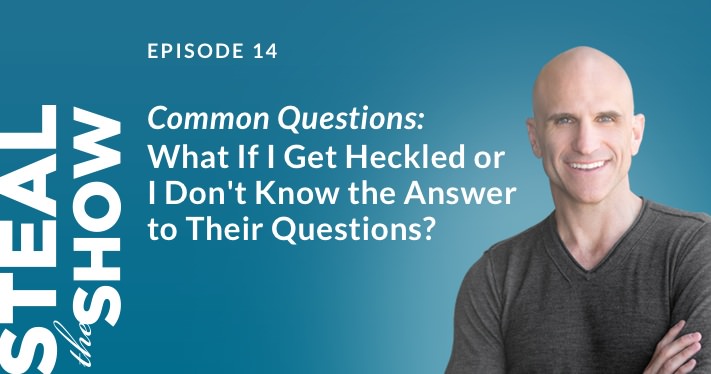00:00 Welcome to Steal The Show with Michael Port. From speeches, to job interviews, to deal closing pitches how to guarantee a standing ovation for all the performances in your life. This is Friday Fan mail. Common and comical public speaking questions and answers. You have questions, I’ve got the answers. And if you like the answers, head on over to stealtheshow.com and check out all of the bonuses I give you when you buy the book, ‘Steal The Show.’ Content creation and story telling templates, tickets to live events around the country, public speaking video documentaries and online training programs and much much more. My goal in life is to delight and entertain you and to help you think bigger about who you are and what you offer the world.
00:48 In today’s episode, I’m gonna answer three questions. The first is sent in by Steven Gideons. He says, “I’m constantly told to slow down. One of your clients said that slowing down is misguided advice. Is that true? And if so what should I do instead?” Yes. Sometimes, it is misguided advice. You don’t always have to slow down, but rather focus on pausing because there’s a lot of power in a pause. Audiences can easily absorb the important points if you give them time in the pause. But if you slow down too much, then they often get bored and you end up sounding very monotone and that doesn’t work very well either. So focus on trying to reach them through your objectives and your motivation and as a result, you’ll move quickly when you need to move quickly and you’ll pause when you need to pause.
01:52 Now, the next question is from Peter Goldman. He says, “How can I avoid an audience member hijacking the microphone during Q&A?” This has happened to me a few times in the past. So a skilled speaker and performer needs to professionally manage their Q&A sessions after a speech. In fact my recommendation is not to take questions at the end of a speech or a presentation. It’s better if the Q&A is a separate segment. So, just put a break in between those. Let people use the loo, go have a cup of coffee, call their families, come back and set up a different environment for the Q&A. Because in most cases your Q&A is gonna have lots of relevant on topic questions. So make your answers super specific, crisp and short. If you have a questioner, however, who is confrontational or won’t give up the mic, you can be gentle or you can be fierce, but need to have the discernment to know which is required and when. So you can say, “Thank you. I’m gonna take the next question.” And then you take the floor back.
03:09 The audience needs to know that you’re in charge of that room and if you don’t demonstrate that you’re in charge, if you allow someone to take over, then you lose the rest of the audience. They will appreciate you taking and maintaining control of that room. So if someone starts out and says, “In my experience”, generally that means they wanna say something or tell you something, not ask a question. They wanna be the speaker and that might not be appropriate for that given moment. So you can very quickly say, “Do you have a question? I’m not sure I heard it correctly.” And you can put it on yourself but you can get them to the point and just keep asking them, “I’m not sure I understand. Could you phrase it a little bit more specifically?” As opposed to putting it on them, you put it on yourself, the audience gets what you’re doing but it is still much more respectful.
04:08 The third question comes from Andrea Rutherford. Hi, Andrea. She says, “What if I don’t know the answer to a question?” “You know I’m not sure. I don’t know the answer to that question, actually. But I could find out. So, what I want you to do is email me at questions@michaelport.com and I will find out an answer by Monday.” I actually do know the answer, but that is one thing you can do when you don’t know the answer. You can say, “I’m not sure what the answer is. That’s interesting. So here’s what I’m gonna do. I’m gonna find out for you. Let’s exchange information so I can get that answer to you and if anybody else here is interested in that answer, I can have it distributed through the organizer to everybody.”
04:53 So that’s one thing you can do. You can also put it out to the audience. You can ask the audience, “Hey. There’s a lot of really clever people in here. Maybe some experts too. Anybody have something that they wanna share as an answer to the question that,” say in this case, “Andrea just asked.” So there are two specific strategies for you to use when somebody asks a question.
05:17 So that’s it for today. That was your Q&A session. If you have more questions, I of course have more answers in the book ‘Steal The Show.’ You can buy it anywhere books are sold or you can go to stealtheshow.com where you can get public speaking video documentaries and online training programs for free when you buy a few copies of the book. Tickets to live events around the country, content creation templates, story telling templates and much, much more. Thank you so much for spending this time. I know that many people compete for your attention and that you’ve got many demands on your time so I am grateful to have this opportunity. I never take it for granted. Keep thinking big about who you are and what you offer the world. Bye for now.








